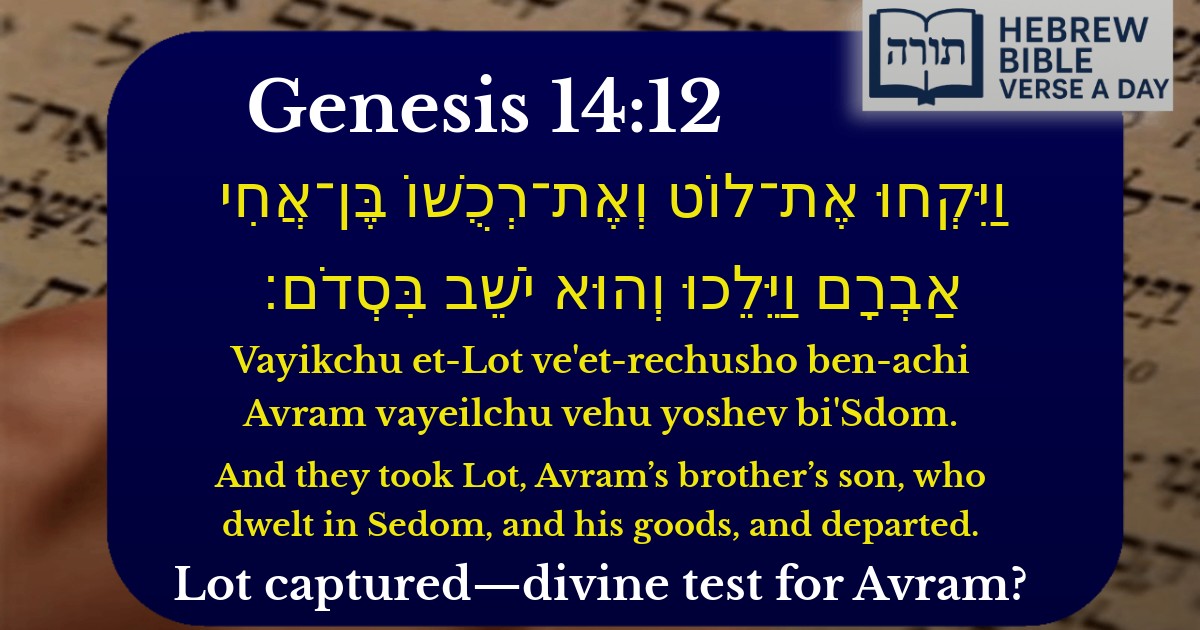Join Our Newsletter To Be Informed When New Videos Are Posted
Join the thousands of fellow Studends who rely on our videos to learn how to read the bible in Hebrew for free!
Hebrew Text
וַיִּקְחוּ אֶת־לוֹט וְאֶת־רְכֻשׁוֹ בֶּן־אֲחִי אַבְרָם וַיֵּלֵכוּ וְהוּא יֹשֵׁב בִּסְדֹם׃
English Translation
And they took Lot, Avram’s brother’s son, who dwelt in Sedom, and his goods, and departed.
Transliteration
Vayikchu et-Lot ve'et-rechusho ben-achi Avram vayeilchu vehu yoshev bi'Sdom.
Hebrew Leining Text
וַיִּקְח֨וּ אֶת־ל֧וֹט וְאֶת־רְכֻשׁ֛וֹ בֶּן־אֲחִ֥י אַבְרָ֖ם וַיֵּלֵ֑כוּ וְה֥וּא יֹשֵׁ֖ב בִּסְדֹֽם׃
Parasha Commentary
📚 Talmud Citations
This verse is not quoted in the Talmud.


Context of the Verse
The verse (Bereishit 14:12) describes the capture of Lot, Avram's nephew, during the war between the four kings and the five kings. Lot had chosen to settle in Sodom, a city known for its wickedness, despite its material prosperity. The verse emphasizes his relationship to Avram ("Avram’s brother’s son") and his residence in Sodom, highlighting key themes of family ties and moral choices.
Rashi's Commentary
Rashi explains that the phrase "who dwelt in Sodom" underscores Lot's deliberate decision to live among the sinful inhabitants of Sodom, despite knowing their corrupt ways. Rashi notes that this choice ultimately led to his capture, implying a measure of divine justice—since Lot aligned himself with the wicked, he shared in their fate (Rashi on Bereishit 14:12).
Midrashic Insights
The Midrash (Bereishit Rabbah 42:8) elaborates on Lot’s character, suggesting that his attachment to material wealth influenced his decision to settle in Sodom. The phrase "and his goods" (וְאֶת־רְכֻשׁוֹ) is interpreted as a reflection of Lot’s misplaced priorities—valuing possessions over righteousness, which made him vulnerable to the consequences of Sodom’s destruction.
Rambam's Perspective
Rambam (Hilchot De'ot 6:1) discusses the importance of distancing oneself from negative influences. Lot’s residence in Sodom serves as a cautionary tale about the dangers of associating with immoral communities, even for personal gain. Rambam emphasizes that one’s environment shapes character, and Lot’s choice to live in Sodom compromised his spiritual integrity.
Lessons from the Talmud
Ibn Ezra’s Linguistic Analysis
Ibn Ezra observes that the phrasing "Avram’s brother’s son" (בֶּן־אֲחִי אַבְרָם) rather than simply "Lot" reinforces his connection to Avram’s merit. Despite Lot’s flawed choices, Avram’s righteousness later secures his rescue (Bereishit 14:16), demonstrating the power of a tzaddik’s influence.